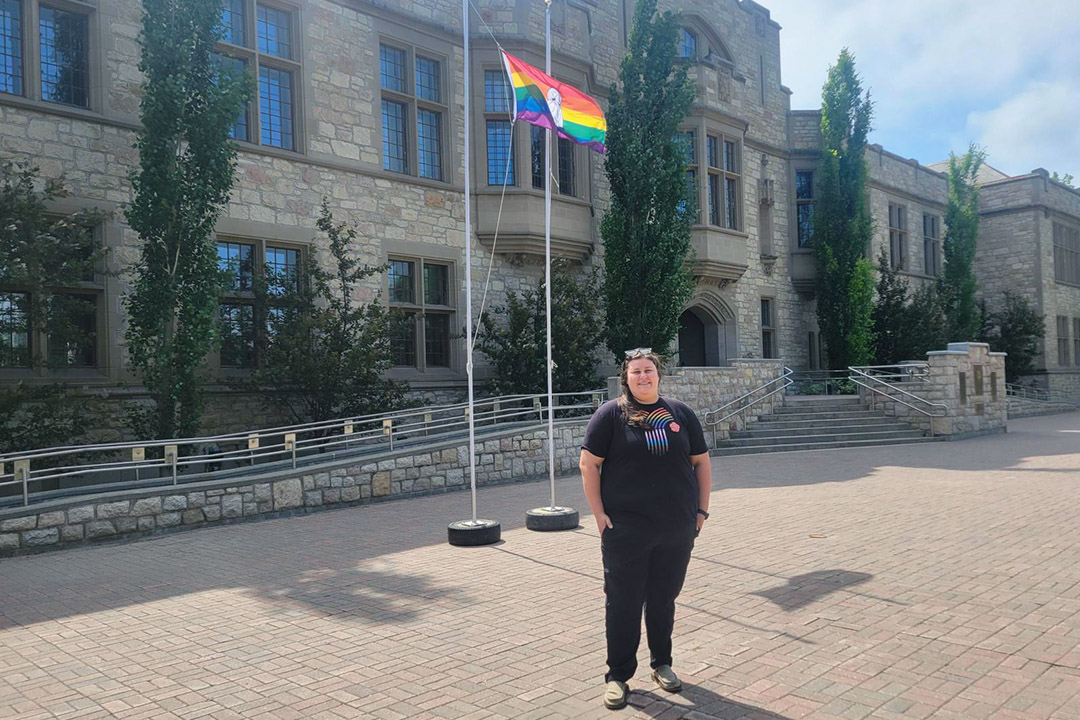
Being two-spirit a holistic, all-encompassing identity for Métis student/staff member at USask
Jocelyn Ormerod is a proud two-spirit Métis woman. She is an alumna of the College of Arts and Science (BA Honours in Indigenous Studies) and holds a certificate in Indigenous Governance and Politics.
By Darla ReadOrmerod is currently an Indigenous Achievement academic advisor in the Edwards School of Business at the University of Saskatchewan (USask), as well as enrolled in the Graduate Level Certificate in Indigenous Nation-Building at the Johnson Shoyama Graduate School of Public Policy. In honour of National Indigenous History Month and Pride Month, we asked Ormerod to share what her identity means to her.
USask: When did you realize you were two-spirit?
Ormerod: I think my journey of self-discovery really started in Grade 5. It was at that time that I started hanging out with the boys in my classes more, I started wearing my brother’s hand-me-downs and started embracing the more masculine side of my identity. It took me a few years to really figure out what was going on, though. Throughout the tail end of elementary school time, I think I really started to question my sexuality and as a result started withdrawing from school, friends and family. I hit my absolute low in high school as I started to come to terms with my attraction to women. I ended up switching high schools in my junior year and was able to live my life a little more out at that point. Just a few months prior to my Grade 12 graduation, I was fully out to all my family. At this point, I was identifying as a lesbian.
USask: Can you explain why this is an important part of your identity?
Ormerod: I have always been really proud of my Métis identity. I was raised by a very strong and proud Metis mother; I was surrounded by my strong Métis grandmother and aunts, and I was brought up with traditional Métis values. When I started to lean into my sexuality, I started learning about different identities. The one that always stood out to me was two-spirit. I have always said that being Métis is the biggest part of my identity – it is that one thing that as early as I can remember, I knew I was Métis. When I realized what two-spirit was, it made sense that it is me. I didn’t start identifying as two-spirit until towards the end of my undergraduate degree. As I have worked towards decolonizing my own perspectives, it has welcomed me into the identity of being a two-spirit Métis woman. While I still identify as a woman and sometimes as a lesbian, the two-spirit identity is all encompassing for me. It encompasses all that I am and is a holistic view on my heritage, sexuality, and gender. I don’t have to adhere to colonialism to define myself as two-spirit.
USask: What does being Indigenous mean to you?
Ormerod: I have never thought about what being Indigenous means to me since I’ve never known anything else. Growing up I was surrounded by culture and tradition. I remember growing up going berry picking with my grandparents in our traditional territory in the Qu’Appelle Valley, I remember going to grandma and grandpa’s, pulling a piece of cardboard out into the middle of their kitchen, and jigging along to fiddle tunes with my cousins, and I remember being involved in the community. Being Indigenous is community. My family was extremely involved in the Métis community in Regina, my mom and grandpa ran Regina Métis Sport & Culture (RMSC) Inc., a hub for Metis people in Regina. Growing up, we were always at RMSC helping. We helped with soup and bannock on Fridays, we helped the kohkums and the mooshums, and when we weren’t helping, we were watching our family help the community. Every spare moment of my family’s time was spent giving back to the community and when I think of Métis values, that is the biggest one. When someone is in need, you help: even if you cannot help a lot, you offer whatever you can.
USask: What would you like people to understand about two-spirit people such as yourself?
Ormerod: Being two-spirit isn’t simply a sexuality or gender identity. It is a holistic, all-encompassing identity, but it isn’t the same to everyone. My two-spirit identity is unique, it is not the same as any other two-spirit persons, but we’re all two-spirit.
Together, we will work towards Truth and Reconciliation. We invite you to join by supporting Indigenous achievement at USask.

